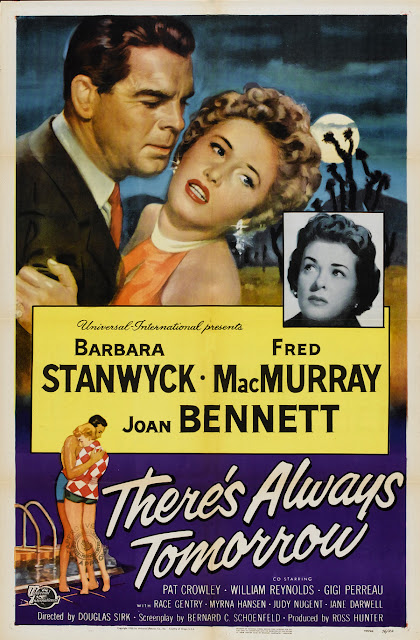In Douglas Sirk’s 1956 soaper There’s Always Tomorrow, Fred MacMurray’s perfect family learns the
hard way that fathers need attention too. MacMurray plays Los Angeles toy
manufacturer Clifford Groves, father of three and married these twenty years to
his high school sweetheart, Marion (Joan Bennett, lovely once again after the
disaster of Highway Dragnet). As the movie unfolds, we meet a man who is
taken utterly for granted by his wife and children. The kids treat him as little
more than a cash machine, without pausing to consider where the money actually
comes from and what their father has to put up with to earn it, while his wife
is so wrapped up in the comings and goings of the kids that she’s often too
busy or too tired to spend time alone with her spouse.
The Groves seem to be comfortable in their familial rut
until Clifford chances into a former employee while at a business meeting in
Palm Springs. Barbara Stanwyck plays Norma Vale, once a toy company employee before
unrequited love forced her to flee the west coast for Manhattan and a wildly
successful career as a fashion designer. She’s been carrying a torch for Clifford
ever since, and the pair spend the balance of their time at the desert resort
innocently reminiscing. Things go wrong when Clifford’s son Vinnie (Bill
Reynolds) spies the pair having a good time and assumes the worst. Before long,
the other Groves children are suspicious of their father, who moment by moment
seems at risk of tipping for his old flame. So in the end it is left to
Stanwyck, one of filmdom’s greatest martyrs, to do the right thing and save the
Grove family from certain disaster.
It almost goes without saying that There’s Always Tomorrow props up the postwar notion of the perfect,
patriarchal family unit, and that the dramatic tension (of this and countless
other films just like it) springs from an external threat to the harmony of
that unit. And while the outcome here is predictable, the film is interesting
in the sense that it makes only the children aware of the peril to their family
— the wife and mother carries on blissfully unaware. Certainly one
might suggest that Joan Bennett’s Marion couldn’t be that naïve, but the movie
makes no overt suggestion that anyone other than Grove children are aware that
their father’s eyes are wandering. In this way the picture utilizes the
vagaries of the ersatz affair to focus on the various wrong interpretations of
the situation the Norma, Clifford, and most importantly, the children
themselves. In this way There’s Always
Tomorrow is quite successful.
In their fourth and final film together, Stanwyck and
MacMurray impress — though she has the better role and does a little more
with it. MacMurray’s chief task is to play a robotic family man (there’s a
great piece of Sirkian symbolism for this in the film) brought back to human
emotion through contact with another woman, while Stanwyck gets to sacrifice
love for likely spinsterhood in an effort to save him — in exchange Sirk
famously gives her the tears through the rainy window treatment. While this
isn’t as soapy and outrageous as some of Sirk’s technicolor melodramas (this
one is black and white) it instead favors believable scenarios and underplayed
performances. At 84 minutes it is over much too quickly, but it remains a
solid, entertaining, and even thoughtful outing from Sirk and company.
There’s Always Tomorrow (1956)
Starring Barbara Stanwyck, Fred MacMurray, and Joan Bennett
Directed by Douglas Sirk
Released by Universal International
Running time: 84 minutes
Availability: widely on DVD, airs on TCM.
Grade: B+


Just caught up with your post -- this sounds really good. I have the film here, just haven't caught up with it yet. Hope to rectify that soon. Thanks for an interesting rundown on the movie!
ReplyDeleteBest wishes,
Laura
Thanks Laura - Hope you enjoy it!
Delete